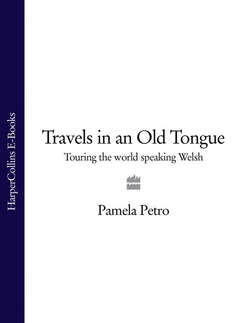Читать книгу Travels in an Old Tongue: Touring the World Speaking Welsh - Pamela Petro - Страница 12
Chwilio to Search
ОглавлениеAn odd thing sometimes happens to me when I’m walking in Wales. Without warning a chip breaks off the corner of my mind’s eye and goes careening up and away, faster and faster – I can almost feel the rush in the depths of my stomach – until it stops in space and turns back to show me myself as a dot on a tiny bump protruding from an island on the north-western corner of the map of Europe. It seems such a funny place for me to be.
I lose my gravity like this on the way to Irene Williams’s house. The sun is shining as if Lampeter were the bloody Caribbean. As ever, I’m the only one in sunglasses (my ‘most American’ affectation, according to Welsh sources). Wales, this land of tumultuous, messy clouds that bank around the heavens like airborne glaciers, is lazing today under a faultless blue sky. It bothers me.
This morning I’ve been hard on the trail of far-flung Welsh-speakers, gleaning addresses and telephone numbers. One is Hiroshi Mizutani – who’s also known by his bardic name, Hywel Glyndŵr – a former visiting professor at Lampeter who teaches Welsh at the University of Nagoya in Japan. Another is a Dutch woman named Effie Wiltens, a pilot and fellow Welsh nut, described to me for the second time in a month as a ‘real character’ who’s learned to speak Welsh like a native, and whom I ‘must meet’. This time, I realize, my unbidden bird’s-eye view has a purpose. It’s set up the board on which we’ll soon start playing global connect-the-dots for real. From what I understand, Irene Williams is what Hollywood would call a ‘major player’ in the dot game.
Mrs Williams comes recommended as a walking address book of the world’s Welsh. Her house is just out of town, past the Cwmann Tavern on the Carmarthen Road (‘Cwmann’, by the way, isn’t a typo; it relies on the perfectly respectable Welsh vowel ‘w’ to give it the sound ‘Coo-man’). Mrs Williams is a lively sprite of a woman in her seventies, wearing striped trousers and a seed necklace. I whisper an apology for my laryngitis as we take seats in her torturously sunny solarium, and tell her I’m hunting foreign Welsh-speakers and expatriates.
‘So, dear, you’re American. Pardon me for asking, but I’ve never understood why your country won’t forgive Cuba for those old missiles.’
This is unexpected. I explain that I haven’t been able to understand it either, but forgo putting my sunglasses on. They suddenly seem way too American. Instead I winch my eyes into slits and begin to leak little tears.
Irene’s husband is Professor of Theology at Lampeter, and she acts as a kind of godmother to the curious lot of foreign students who show an interest in learning Welsh. Takeshi Koike, a student of Hiroshi Mizutani’s, is one of her favourites. She waves his Christmas card at me and I copy the address.
‘He was here for ten months and when he left he was fluent in Welsh. It helped that he played guitar at church. Every Saturday night he’d come over and we’d practise Welsh hymns. He even appeared in all-Welsh theatre productions. Are you all right, dear?’
I think I’ve groaned involuntarily, remembering Mark Nodine. Irene brings me a piece of spice cake and I thank her in Welsh, which is wilfully reckless, but the Takeshi story nettles me. There’s a pause. Will she simply say, croeso – you’re welcome – or launch into the old tongue in earnest? She takes a middle course which requires a few, simple exclamations on my part before she eases back into English. I don’t know how to take this. Is it too painful to hear me croak and struggle for words simultaneously? Am I incomprehensible? God, is she being nice to me?
Irene gives me a number of leads, including one in Poland, which cheers me, as so far nothing has come of my missive to Gdansk. Before I leave we determine that her daughter-in-law, Glesni, is best friends with Rosemary, with whom I’m to stay in Oslo.
‘She called Glesni a few days ago asking about you, and here you are!’
An itchy, small-world sensation tweaks me between the shoulder-blades. I have a feeling I could probably write this book if I stayed long enough on Irene Williams’s sun porch. Instead I thank her and walk away through a tunnel of hedgerows to the tiny village of Cellan to hire a car.
